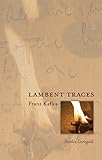Lambent Traces : Franz Kafka / Stanley Corngold.
Material type: TextPublisher: Princeton, NJ : Princeton University Press, [2009]Copyright date: ©2004Edition: Course BookDescription: 1 online resourceContent type:
TextPublisher: Princeton, NJ : Princeton University Press, [2009]Copyright date: ©2004Edition: Course BookDescription: 1 online resourceContent type: - 9780691127804
- 9781400826131
- 833.912
- PT2621.A26C67 2004
- online - DeGruyter
- Issued also in print.
| Item type | Current library | Call number | URL | Status | Notes | Barcode | |
|---|---|---|---|---|---|---|---|
 eBook
eBook
|
Biblioteca "Angelicum" Pont. Univ. S.Tommaso d'Aquino Nuvola online | online - DeGruyter (Browse shelf(Opens below)) | Online access | Not for loan (Accesso limitato) | Accesso per gli utenti autorizzati / Access for authorized users | (dgr)9781400826131 |
Frontmatter -- Contents -- Preface -- Abbreviations for Kafka Citations -- Introduction: Beginnings -- Chapter 1. In the Circle of "The Judgment" -- Chapter 2. The Trial: The Guilt of an Unredeemed Literary Promise -- Chapter 3. Medial Interferences in The Trial -- Chapter 4. Allotria and Excreta in "In the Penal Colony" -- Chapter 5. Nietzsche, Kafka, and Literary Paternity -- Chapter 6. Something to Do with the Truth -- Chapter 7. "A Faith Like a Guillotine" -- Chapter 8. Kafka and the Dialect of Minor Literature -- Chapter 9. Adorno's "Notes on Kafka" -- Chapter 10. On Translation Mistakes, with Special Attention to Kafka in Amerika -- Chapter 11. The Trouble with Cultural Studies -- Notes -- Acknowledgments -- Index
restricted access online access with authorization star
http://purl.org/coar/access_right/c_16ec
On the night of September 22, 1912, Franz Kafka wrote his story "The Judgment," which came out of him "like a regular birth." This act of creation struck him as an unmistakable sign of his literary destiny. Thereafter, the search of many of his characters for the Law, for a home, for artistic fulfillment can be understood as a figure for Kafka's own search to reproduce the ecstasy of a single night. In Lambent Traces: Franz Kafka, the preeminent American critic and translator of Franz Kafka traces the implications of Kafka's literary breakthrough. Kafka's first concern was not his responsibility to his culture but to his fate as literature, which he pursued by exploring "the limits of the human." At the same time, he kept his transcendental longings sober by noting--with incomparable irony--their virtual impossibility. At times Kafka's passion for personal transcendence as a writer entered into a torturous and witty conflict with his desire for another sort of transcendence, one driven by a modern Gnosticism. This struggle prompted him continually to scrutinize different kinds of mediation, such as confessional writing, the dream, the media, the idea of marriage, skepticism, asceticism, and the imitation of death. Lambent Traces: Franz Kafka concludes with a reconstruction and critique of the approaches to Kafka by such major critics as Adorno, Gilman, and Deleuze and Guattari.
Issued also in print.
Mode of access: Internet via World Wide Web.
In English.
Description based on online resource; title from PDF title page (publisher's Web site, viewed 08. Jul 2019)


